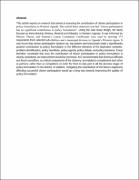Citizen Participation and Policy Formulation: A Study of Bottom-up, Top-down, and Horizontal Scenarios in Local Councils in Western Uganda
Abstract
Abstract
This article reports on research that aimed at assessing the contribution of citizen participation in policy formulation in Western Uganda. The central thesis statement was that “citizen participation has no significant contribution to policy formulation”. Using the case study design, the study focused on three districts (Hoima, Masindi and Kibaale), in Western Uganda. It was informed by Marxist Theory, and Pearson’s Linear Correlation Coefficients were used by drawing 173 respondents from selected sub-counties and a municipal division in Uganda’s Western region. It was found that citizen participation (bottom-up, top-bottom and horizontal) made a significantly positive contribution to policy formulation in the different elements of the dependent variables: problem identification, policy manifesto, policy agenda, policy debate, and policy decisions. It was therefore concluded that once the contribution of citizen participation to policy formulation is clearly considered, its improvement would be enormous. It is recommended that technical officials and local councillors, as critical components of the citizenry, be enabled to complement each other as partners–rather than as competitors–in order for them to take part in all the decisive stages of policy formulation in the district. In addition, mitigating the contribution of the factors negatively affecting successful citizen participation would go a long way towards improving the quality of policy formulation
Collections
- Research Articles [142]

